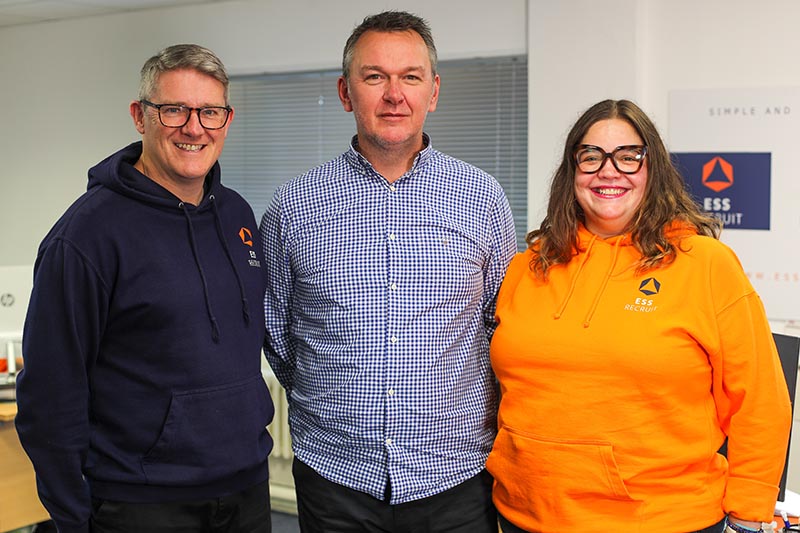
A Scottish recruitment company claims Dundee could hold the key to a shortage affecting the country’s manufacturing, engineering and technology businesses.
ESS Recruit, which launched in 2015, has taken up residence in the city’s Flour Mill, Exchange Court. Focusing on everything from carbon capture, hydrogen and renewables to engineering, life sciences and electronics, Dalgety-Bay-based ESS Recruit is co-owned by Craig Jackson, originally from Carnoustie, and fellow directors Bruce Hydes and Sara Zorriasatein. Staff also work from virtual offices in Edinburgh, Ayr and Elgin.
Viewing the new Dundee office as his ‘homecoming’, Craig said, “With so much recruitment centred on the central belt, people living and working around Dundee have not always been identified as a credible match to these employers, and that’s a travesty. So yes, we want to bring in the skills the city needs, but these skills may already be here. By matching them with the right candidates, we allow these businesses to take hold and grow, including emerging start-ups and university spin-outs.
“Historically, Dundee has been under-represented in the technology and engineering recruitment space so those employers are welcoming our presence here. We have a policy of employing staff not just from recruitment backgrounds but the sectors we work in. That way, we really understand the detail behind a job title and both the technical and person skills required.”
The company is on target to deliver a turnover of over £3 million this year. ESS Recruit has grown its workforce from three to 11 in just 18 months, with plans to create additional posts in the months ahead, including apprenticeships.
Through the new Dundee office, ESS Recruit builds on a legacy of finding work for local people, including those made redundant following Michelin’s departure from the city in 2020.
To bolster its efforts, the company has engaged the services of consultant Roddy Donaldson. Roddy, based in Berwick, has over 30 years’ experience in the recruitment industry, specialising in manufacturing, engineering and construction.
He said, “With recruitment, the real impact happens when you understand the needs of both the candidate and the client. Too many recruitment agencies don’t appreciate the intricacies of the role, especially when it’s technically complex. We go in, get under the skin of the business, its pain points and its recruitment cycle and then do the same with the candidates, ensuring we grasp the qualities, skills and expertise they bring to the table. Only then can you identify the best candidates for their positions and allow these businesses to grow and expand.”
With huge opportunities looming within the renewables sector, an estimated 50,000 to 120,000 jobs will be created in hydrogen, carbon capture and renewables within the next five to 10 years. ESS Recruit is determined to keep abreast of changes in industry and works closely with various industry associations. As well as being a member of NECCUS, the company sponsors NECCUS’ Young Professionals Award: Recognizing Trailblazers in Scotland’s Industrial Decarbonisation Efforts and is a member of the Scottish Hydrogen and Fuel Cell Association and Technology Scotland.
Craig added, “Initially, it was thought that with the decline in oil and gas, people working in these areas would naturally move into renewables and fill the gap. However, with many set to retire or relocate internationally to stay in the sector, the focus needs to switch to retraining and upskilling.
“That’s where colleges and universities come in, ensuring they embed the skills employers need. It’s fantastic to see that the MSIP Skills Academy is now operational, providing dedicated skills training to current and prospective employees. There’s also a huge job to ensure with schools, promoting the careers and the career paths for the jobs which are coming, to open minds and make it real for pupils. But, crucially, countless people living and working locally have skills transferable to these industries right now, ready to make the move. It’s our role to do the matchmaking.”








